-
EXECUTIVE SUMMARY
-
Market Overview
-
Key Findings
-
Market Segmentation
-
Competitive Landscape
-
Challenges and Opportunities
-
Future Outlook
-
MARKET INTRODUCTION
-
Definition
-
Scope of the study
- Research Objective
- Assumption
- Limitations
-
RESEARCH METHODOLOGY
-
Overview
-
Data Mining
-
Secondary Research
-
Primary Research
- Primary Interviews and Information Gathering Process
- Breakdown of Primary Respondents
-
Forecasting Model
-
Market Size Estimation
- Bottom-Up Approach
- Top-Down Approach
-
Data Triangulation
-
Validation
-
MARKET DYNAMICS
-
Overview
-
Drivers
-
Restraints
-
Opportunities
-
MARKET FACTOR ANALYSIS
-
Value chain Analysis
-
Porter's Five Forces Analysis
- Bargaining Power of Suppliers
- Bargaining Power of Buyers
- Threat of New Entrants
- Threat of Substitutes
- Intensity of Rivalry
-
COVID-19 Impact Analysis
- Market Impact Analysis
- Regional Impact
- Opportunity and Threat Analysis
-
COSMETIC PRODUCTS MARKET, BY PRODUCT TYPE (USD BILLION)
-
Skincare
-
Makeup
-
Fragrance
-
Haircare
-
Personal Care
-
COSMETIC PRODUCTS MARKET, BY GENDER (USD BILLION)
-
Female
-
Male
-
Unisex
-
COSMETIC PRODUCTS MARKET, BY DISTRIBUTION CHANNEL (USD BILLION)
-
Online
-
Offline
-
Retail Stores
-
Specialty Stores
-
COSMETIC PRODUCTS MARKET, BY FORMULATION (USD BILLION)
-
Organic
-
Natural
-
Synthetic
-
Cruelty-Free
-
COSMETIC PRODUCTS MARKET, BY REGIONAL (USD BILLION)
-
North America
- US
- Canada
-
Europe
- Germany
- UK
- France
- Russia
- Italy
- Spain
- Rest of Europe
-
APAC
- China
- India
- Japan
- South Korea
- Malaysia
- Thailand
- Indonesia
- Rest of APAC
-
South America
- Brazil
- Mexico
- Argentina
- Rest of South America
-
MEA
- GCC Countries
- South Africa
- Rest of MEA
-
COMPETITIVE LANDSCAPE
-
Overview
-
Competitive Analysis
-
Market share Analysis
-
Major Growth Strategy in the Cosmetic Products Market
-
Competitive Benchmarking
-
Leading Players in Terms of Number of Developments in the Cosmetic Products Market
-
Key developments and growth strategies
- New Product Launch/Service Deployment
- Merger & Acquisitions
- Joint Ventures
-
Major Players Financial Matrix
- Sales and Operating Income
- Major Players R&D Expenditure. 2023
-
COMPANY PROFILES
-
Avon
- Financial Overview
- Products Offered
- Key Developments
- SWOT Analysis
- Key Strategies
-
Shiseido
- Financial Overview
- Products Offered
- Key Developments
- SWOT Analysis
- Key Strategies
-
Mary Kay
- Financial Overview
- Products Offered
- Key Developments
- SWOT Analysis
- Key Strategies
-
Revlon
- Financial Overview
- Products Offered
- Key Developments
- SWOT Analysis
- Key Strategies
-
Beiersdorf
- Financial Overview
- Products Offered
- Key Developments
- SWOT Analysis
- Key Strategies
-
Amway
- Financial Overview
- Products Offered
- Key Developments
- SWOT Analysis
- Key Strategies
-
Unilever
- Financial Overview
- Products Offered
- Key Developments
- SWOT Analysis
- Key Strategies
-
Procter and Gamble
- Financial Overview
- Products Offered
- Key Developments
- SWOT Analysis
- Key Strategies
-
Oriflame
- Financial Overview
- Products Offered
- Key Developments
- SWOT Analysis
- Key Strategies
-
LVMH
- Financial Overview
- Products Offered
- Key Developments
- SWOT Analysis
- Key Strategies
-
Pezzi
- Financial Overview
- Products Offered
- Key Developments
- SWOT Analysis
- Key Strategies
-
Coty
- Financial Overview
- Products Offered
- Key Developments
- SWOT Analysis
- Key Strategies
-
L'Oreal
- Financial Overview
- Products Offered
- Key Developments
- SWOT Analysis
- Key Strategies
-
Estée Lauder
- Financial Overview
- Products Offered
- Key Developments
- SWOT Analysis
- Key Strategies
-
APPENDIX
-
References
-
Related Reports
-
LIST OF TABLES
-
LIST OF ASSUMPTIONS
-
NORTH AMERICA COSMETIC PRODUCTS MARKET SIZE ESTIMATES & FORECAST, BY PRODUCT TYPE, 2019-2035 (USD BILLIONS)
-
NORTH AMERICA COSMETIC PRODUCTS MARKET SIZE ESTIMATES & FORECAST, BY GENDER, 2019-2035 (USD BILLIONS)
-
NORTH AMERICA COSMETIC PRODUCTS MARKET SIZE ESTIMATES & FORECAST, BY DISTRIBUTION CHANNEL, 2019-2035 (USD BILLIONS)
-
NORTH AMERICA COSMETIC PRODUCTS MARKET SIZE ESTIMATES & FORECAST, BY FORMULATION, 2019-2035 (USD BILLIONS)
-
NORTH AMERICA COSMETIC PRODUCTS MARKET SIZE ESTIMATES & FORECAST, BY REGIONAL, 2019-2035 (USD BILLIONS)
-
US COSMETIC PRODUCTS MARKET SIZE ESTIMATES & FORECAST, BY PRODUCT TYPE, 2019-2035 (USD BILLIONS)
-
US COSMETIC PRODUCTS MARKET SIZE ESTIMATES & FORECAST, BY GENDER, 2019-2035 (USD BILLIONS)
-
US COSMETIC PRODUCTS MARKET SIZE ESTIMATES & FORECAST, BY DISTRIBUTION CHANNEL, 2019-2035 (USD BILLIONS)
-
US COSMETIC PRODUCTS MARKET SIZE ESTIMATES & FORECAST, BY FORMULATION, 2019-2035 (USD BILLIONS)
-
US COSMETIC PRODUCTS MARKET SIZE ESTIMATES & FORECAST, BY REGIONAL, 2019-2035 (USD BILLIONS)
-
CANADA COSMETIC PRODUCTS MARKET SIZE ESTIMATES & FORECAST, BY PRODUCT TYPE, 2019-2035 (USD BILLIONS)
-
CANADA COSMETIC PRODUCTS MARKET SIZE ESTIMATES & FORECAST, BY GENDER, 2019-2035 (USD BILLIONS)
-
CANADA COSMETIC PRODUCTS MARKET SIZE ESTIMATES & FORECAST, BY DISTRIBUTION CHANNEL, 2019-2035 (USD BILLIONS)
-
CANADA COSMETIC PRODUCTS MARKET SIZE ESTIMATES & FORECAST, BY FORMULATION, 2019-2035 (USD BILLIONS)
-
CANADA COSMETIC PRODUCTS MARKET SIZE ESTIMATES & FORECAST, BY REGIONAL, 2019-2035 (USD BILLIONS)
-
EUROPE COSMETIC PRODUCTS MARKET SIZE ESTIMATES & FORECAST, BY PRODUCT TYPE, 2019-2035 (USD BILLIONS)
-
EUROPE COSMETIC PRODUCTS MARKET SIZE ESTIMATES & FORECAST, BY GENDER, 2019-2035 (USD BILLIONS)
-
EUROPE COSMETIC PRODUCTS MARKET SIZE ESTIMATES & FORECAST, BY DISTRIBUTION CHANNEL, 2019-2035 (USD BILLIONS)
-
EUROPE COSMETIC PRODUCTS MARKET SIZE ESTIMATES & FORECAST, BY FORMULATION, 2019-2035 (USD BILLIONS)
-
EUROPE COSMETIC PRODUCTS MARKET SIZE ESTIMATES & FORECAST, BY REGIONAL, 2019-2035 (USD BILLIONS)
-
GERMANY COSMETIC PRODUCTS MARKET SIZE ESTIMATES & FORECAST, BY PRODUCT TYPE, 2019-2035 (USD BILLIONS)
-
GERMANY COSMETIC PRODUCTS MARKET SIZE ESTIMATES & FORECAST, BY GENDER, 2019-2035 (USD BILLIONS)
-
GERMANY COSMETIC PRODUCTS MARKET SIZE ESTIMATES & FORECAST, BY DISTRIBUTION CHANNEL, 2019-2035 (USD BILLIONS)
-
GERMANY COSMETIC PRODUCTS MARKET SIZE ESTIMATES & FORECAST, BY FORMULATION, 2019-2035 (USD BILLIONS)
-
GERMANY COSMETIC PRODUCTS MARKET SIZE ESTIMATES & FORECAST, BY REGIONAL, 2019-2035 (USD BILLIONS)
-
UK COSMETIC PRODUCTS MARKET SIZE ESTIMATES & FORECAST, BY PRODUCT TYPE, 2019-2035 (USD BILLIONS)
-
UK COSMETIC PRODUCTS MARKET SIZE ESTIMATES & FORECAST, BY GENDER, 2019-2035 (USD BILLIONS)
-
UK COSMETIC PRODUCTS MARKET SIZE ESTIMATES & FORECAST, BY DISTRIBUTION CHANNEL, 2019-2035 (USD BILLIONS)
-
UK COSMETIC PRODUCTS MARKET SIZE ESTIMATES & FORECAST, BY FORMULATION, 2019-2035 (USD BILLIONS)
-
UK COSMETIC PRODUCTS MARKET SIZE ESTIMATES & FORECAST, BY REGIONAL, 2019-2035 (USD BILLIONS)
-
FRANCE COSMETIC PRODUCTS MARKET SIZE ESTIMATES & FORECAST, BY PRODUCT TYPE, 2019-2035 (USD BILLIONS)
-
FRANCE COSMETIC PRODUCTS MARKET SIZE ESTIMATES & FORECAST, BY GENDER, 2019-2035 (USD BILLIONS)
-
FRANCE COSMETIC PRODUCTS MARKET SIZE ESTIMATES & FORECAST, BY DISTRIBUTION CHANNEL, 2019-2035 (USD BILLIONS)
-
FRANCE COSMETIC PRODUCTS MARKET SIZE ESTIMATES & FORECAST, BY FORMULATION, 2019-2035 (USD BILLIONS)
-
FRANCE COSMETIC PRODUCTS MARKET SIZE ESTIMATES & FORECAST, BY REGIONAL, 2019-2035 (USD BILLIONS)
-
RUSSIA COSMETIC PRODUCTS MARKET SIZE ESTIMATES & FORECAST, BY PRODUCT TYPE, 2019-2035 (USD BILLIONS)
-
RUSSIA COSMETIC PRODUCTS MARKET SIZE ESTIMATES & FORECAST, BY GENDER, 2019-2035 (USD BILLIONS)
-
RUSSIA COSMETIC PRODUCTS MARKET SIZE ESTIMATES & FORECAST, BY DISTRIBUTION CHANNEL, 2019-2035 (USD BILLIONS)
-
RUSSIA COSMETIC PRODUCTS MARKET SIZE ESTIMATES & FORECAST, BY FORMULATION, 2019-2035 (USD BILLIONS)
-
RUSSIA COSMETIC PRODUCTS MARKET SIZE ESTIMATES & FORECAST, BY REGIONAL, 2019-2035 (USD BILLIONS)
-
ITALY COSMETIC PRODUCTS MARKET SIZE ESTIMATES & FORECAST, BY PRODUCT TYPE, 2019-2035 (USD BILLIONS)
-
ITALY COSMETIC PRODUCTS MARKET SIZE ESTIMATES & FORECAST, BY GENDER, 2019-2035 (USD BILLIONS)
-
ITALY COSMETIC PRODUCTS MARKET SIZE ESTIMATES & FORECAST, BY DISTRIBUTION CHANNEL, 2019-2035 (USD BILLIONS)
-
ITALY COSMETIC PRODUCTS MARKET SIZE ESTIMATES & FORECAST, BY FORMULATION, 2019-2035 (USD BILLIONS)
-
ITALY COSMETIC PRODUCTS MARKET SIZE ESTIMATES & FORECAST, BY REGIONAL, 2019-2035 (USD BILLIONS)
-
SPAIN COSMETIC PRODUCTS MARKET SIZE ESTIMATES & FORECAST, BY PRODUCT TYPE, 2019-2035 (USD BILLIONS)
-
SPAIN COSMETIC PRODUCTS MARKET SIZE ESTIMATES & FORECAST, BY GENDER, 2019-2035 (USD BILLIONS)
-
SPAIN COSMETIC PRODUCTS MARKET SIZE ESTIMATES & FORECAST, BY DISTRIBUTION CHANNEL, 2019-2035 (USD BILLIONS)
-
SPAIN COSMETIC PRODUCTS MARKET SIZE ESTIMATES & FORECAST, BY FORMULATION, 2019-2035 (USD BILLIONS)
-
SPAIN COSMETIC PRODUCTS MARKET SIZE ESTIMATES & FORECAST, BY REGIONAL, 2019-2035 (USD BILLIONS)
-
REST OF EUROPE COSMETIC PRODUCTS MARKET SIZE ESTIMATES & FORECAST, BY PRODUCT TYPE, 2019-2035 (USD BILLIONS)
-
REST OF EUROPE COSMETIC PRODUCTS MARKET SIZE ESTIMATES & FORECAST, BY GENDER, 2019-2035 (USD BILLIONS)
-
REST OF EUROPE COSMETIC PRODUCTS MARKET SIZE ESTIMATES & FORECAST, BY DISTRIBUTION CHANNEL, 2019-2035 (USD BILLIONS)
-
REST OF EUROPE COSMETIC PRODUCTS MARKET SIZE ESTIMATES & FORECAST, BY FORMULATION, 2019-2035 (USD BILLIONS)
-
REST OF EUROPE COSMETIC PRODUCTS MARKET SIZE ESTIMATES & FORECAST, BY REGIONAL, 2019-2035 (USD BILLIONS)
-
APAC COSMETIC PRODUCTS MARKET SIZE ESTIMATES & FORECAST, BY PRODUCT TYPE, 2019-2035 (USD BILLIONS)
-
APAC COSMETIC PRODUCTS MARKET SIZE ESTIMATES & FORECAST, BY GENDER, 2019-2035 (USD BILLIONS)
-
APAC COSMETIC PRODUCTS MARKET SIZE ESTIMATES & FORECAST, BY DISTRIBUTION CHANNEL, 2019-2035 (USD BILLIONS)
-
APAC COSMETIC PRODUCTS MARKET SIZE ESTIMATES & FORECAST, BY FORMULATION, 2019-2035 (USD BILLIONS)
-
APAC COSMETIC PRODUCTS MARKET SIZE ESTIMATES & FORECAST, BY REGIONAL, 2019-2035 (USD BILLIONS)
-
CHINA COSMETIC PRODUCTS MARKET SIZE ESTIMATES & FORECAST, BY PRODUCT TYPE, 2019-2035 (USD BILLIONS)
-
CHINA COSMETIC PRODUCTS MARKET SIZE ESTIMATES & FORECAST, BY GENDER, 2019-2035 (USD BILLIONS)
-
CHINA COSMETIC PRODUCTS MARKET SIZE ESTIMATES & FORECAST, BY DISTRIBUTION CHANNEL, 2019-2035 (USD BILLIONS)
-
CHINA COSMETIC PRODUCTS MARKET SIZE ESTIMATES & FORECAST, BY FORMULATION, 2019-2035 (USD BILLIONS)
-
CHINA COSMETIC PRODUCTS MARKET SIZE ESTIMATES & FORECAST, BY REGIONAL, 2019-2035 (USD BILLIONS)
-
INDIA COSMETIC PRODUCTS MARKET SIZE ESTIMATES & FORECAST, BY PRODUCT TYPE, 2019-2035 (USD BILLIONS)
-
INDIA COSMETIC PRODUCTS MARKET SIZE ESTIMATES & FORECAST, BY GENDER, 2019-2035 (USD BILLIONS)
-
INDIA COSMETIC PRODUCTS MARKET SIZE ESTIMATES & FORECAST, BY DISTRIBUTION CHANNEL, 2019-2035 (USD BILLIONS)
-
INDIA COSMETIC PRODUCTS MARKET SIZE ESTIMATES & FORECAST, BY FORMULATION, 2019-2035 (USD BILLIONS)
-
INDIA COSMETIC PRODUCTS MARKET SIZE ESTIMATES & FORECAST, BY REGIONAL, 2019-2035 (USD BILLIONS)
-
JAPAN COSMETIC PRODUCTS MARKET SIZE ESTIMATES & FORECAST, BY PRODUCT TYPE, 2019-2035 (USD BILLIONS)
-
JAPAN COSMETIC PRODUCTS MARKET SIZE ESTIMATES & FORECAST, BY GENDER, 2019-2035 (USD BILLIONS)
-
JAPAN COSMETIC PRODUCTS MARKET SIZE ESTIMATES & FORECAST, BY DISTRIBUTION CHANNEL, 2019-2035 (USD BILLIONS)
-
JAPAN COSMETIC PRODUCTS MARKET SIZE ESTIMATES & FORECAST, BY FORMULATION, 2019-2035 (USD BILLIONS)
-
JAPAN COSMETIC PRODUCTS MARKET SIZE ESTIMATES & FORECAST, BY REGIONAL, 2019-2035 (USD BILLIONS)
-
SOUTH KOREA COSMETIC PRODUCTS MARKET SIZE ESTIMATES & FORECAST, BY PRODUCT TYPE, 2019-2035 (USD BILLIONS)
-
SOUTH KOREA COSMETIC PRODUCTS MARKET SIZE ESTIMATES & FORECAST, BY GENDER, 2019-2035 (USD BILLIONS)
-
SOUTH KOREA COSMETIC PRODUCTS MARKET SIZE ESTIMATES & FORECAST, BY DISTRIBUTION CHANNEL, 2019-2035 (USD BILLIONS)
-
SOUTH KOREA COSMETIC PRODUCTS MARKET SIZE ESTIMATES & FORECAST, BY FORMULATION, 2019-2035 (USD BILLIONS)
-
SOUTH KOREA COSMETIC PRODUCTS MARKET SIZE ESTIMATES & FORECAST, BY REGIONAL, 2019-2035 (USD BILLIONS)
-
MALAYSIA COSMETIC PRODUCTS MARKET SIZE ESTIMATES & FORECAST, BY PRODUCT TYPE, 2019-2035 (USD BILLIONS)
-
MALAYSIA COSMETIC PRODUCTS MARKET SIZE ESTIMATES & FORECAST, BY GENDER, 2019-2035 (USD BILLIONS)
-
MALAYSIA COSMETIC PRODUCTS MARKET SIZE ESTIMATES & FORECAST, BY DISTRIBUTION CHANNEL, 2019-2035 (USD BILLIONS)
-
MALAYSIA COSMETIC PRODUCTS MARKET SIZE ESTIMATES & FORECAST, BY FORMULATION, 2019-2035 (USD BILLIONS)
-
MALAYSIA COSMETIC PRODUCTS MARKET SIZE ESTIMATES & FORECAST, BY REGIONAL, 2019-2035 (USD BILLIONS)
-
THAILAND COSMETIC PRODUCTS MARKET SIZE ESTIMATES & FORECAST, BY PRODUCT TYPE, 2019-2035 (USD BILLIONS)
-
THAILAND COSMETIC PRODUCTS MARKET SIZE ESTIMATES & FORECAST, BY GENDER, 2019-2035 (USD BILLIONS)
-
THAILAND COSMETIC PRODUCTS MARKET SIZE ESTIMATES & FORECAST, BY DISTRIBUTION CHANNEL, 2019-2035 (USD BILLIONS)
-
THAILAND COSMETIC PRODUCTS MARKET SIZE ESTIMATES & FORECAST, BY FORMULATION, 2019-2035 (USD BILLIONS)
-
THAILAND COSMETIC PRODUCTS MARKET SIZE ESTIMATES & FORECAST, BY REGIONAL, 2019-2035 (USD BILLIONS)
-
INDONESIA COSMETIC PRODUCTS MARKET SIZE ESTIMATES & FORECAST, BY PRODUCT TYPE, 2019-2035 (USD BILLIONS)
-
INDONESIA COSMETIC PRODUCTS MARKET SIZE ESTIMATES & FORECAST, BY GENDER, 2019-2035 (USD BILLIONS)
-
INDONESIA COSMETIC PRODUCTS MARKET SIZE ESTIMATES & FORECAST, BY DISTRIBUTION CHANNEL, 2019-2035 (USD BILLIONS)
-
INDONESIA COSMETIC PRODUCTS MARKET SIZE ESTIMATES & FORECAST, BY FORMULATION, 2019-2035 (USD BILLIONS)
-
INDONESIA COSMETIC PRODUCTS MARKET SIZE ESTIMATES & FORECAST, BY REGIONAL, 2019-2035 (USD BILLIONS)
-
REST OF APAC COSMETIC PRODUCTS MARKET SIZE ESTIMATES & FORECAST, BY PRODUCT TYPE, 2019-2035 (USD BILLIONS)
-
REST OF APAC COSMETIC PRODUCTS MARKET SIZE ESTIMATES & FORECAST, BY GENDER, 2019-2035 (USD BILLIONS)
-
REST OF APAC COSMETIC PRODUCTS MARKET SIZE ESTIMATES & FORECAST, BY DISTRIBUTION CHANNEL, 2019-2035 (USD BILLIONS)
-
REST OF APAC COSMETIC PRODUCTS MARKET SIZE ESTIMATES & FORECAST, BY FORMULATION, 2019-2035 (USD BILLIONS)
-
REST OF APAC COSMETIC PRODUCTS MARKET SIZE ESTIMATES & FORECAST, BY REGIONAL, 2019-2035 (USD BILLIONS)
-
SOUTH AMERICA COSMETIC PRODUCTS MARKET SIZE ESTIMATES & FORECAST, BY PRODUCT TYPE, 2019-2035 (USD BILLIONS)
-
SOUTH AMERICA COSMETIC PRODUCTS MARKET SIZE ESTIMATES & FORECAST, BY GENDER, 2019-2035 (USD BILLIONS)
-
SOUTH AMERICA COSMETIC PRODUCTS MARKET SIZE ESTIMATES & FORECAST, BY DISTRIBUTION CHANNEL, 2019-2035 (USD BILLIONS)
-
SOUTH AMERICA COSMETIC PRODUCTS MARKET SIZE ESTIMATES & FORECAST, BY FORMULATION, 2019-2035 (USD BILLIONS)
-
SOUTH AMERICA COSMETIC PRODUCTS MARKET SIZE ESTIMATES & FORECAST, BY REGIONAL, 2019-2035 (USD BILLIONS)
-
BRAZIL COSMETIC PRODUCTS MARKET SIZE ESTIMATES & FORECAST, BY PRODUCT TYPE, 2019-2035 (USD BILLIONS)
-
BRAZIL COSMETIC PRODUCTS MARKET SIZE ESTIMATES & FORECAST, BY GENDER, 2019-2035 (USD BILLIONS)
-
BRAZIL COSMETIC PRODUCTS MARKET SIZE ESTIMATES & FORECAST, BY DISTRIBUTION CHANNEL, 2019-2035 (USD BILLIONS)
-
BRAZIL COSMETIC PRODUCTS MARKET SIZE ESTIMATES & FORECAST, BY FORMULATION, 2019-2035 (USD BILLIONS)
-
BRAZIL COSMETIC PRODUCTS MARKET SIZE ESTIMATES & FORECAST, BY REGIONAL, 2019-2035 (USD BILLIONS)
-
MEXICO COSMETIC PRODUCTS MARKET SIZE ESTIMATES & FORECAST, BY PRODUCT TYPE, 2019-2035 (USD BILLIONS)
-
MEXICO COSMETIC PRODUCTS MARKET SIZE ESTIMATES & FORECAST, BY GENDER, 2019-2035 (USD BILLIONS)
-
MEXICO COSMETIC PRODUCTS MARKET SIZE ESTIMATES & FORECAST, BY DISTRIBUTION CHANNEL, 2019-2035 (USD BILLIONS)
-
MEXICO COSMETIC PRODUCTS MARKET SIZE ESTIMATES & FORECAST, BY FORMULATION, 2019-2035 (USD BILLIONS)
-
MEXICO COSMETIC PRODUCTS MARKET SIZE ESTIMATES & FORECAST, BY REGIONAL, 2019-2035 (USD BILLIONS)
-
ARGENTINA COSMETIC PRODUCTS MARKET SIZE ESTIMATES & FORECAST, BY PRODUCT TYPE, 2019-2035 (USD BILLIONS)
-
ARGENTINA COSMETIC PRODUCTS MARKET SIZE ESTIMATES & FORECAST, BY GENDER, 2019-2035 (USD BILLIONS)
-
ARGENTINA COSMETIC PRODUCTS MARKET SIZE ESTIMATES & FORECAST, BY DISTRIBUTION CHANNEL, 2019-2035 (USD BILLIONS)
-
ARGENTINA COSMETIC PRODUCTS MARKET SIZE ESTIMATES & FORECAST, BY FORMULATION, 2019-2035 (USD BILLIONS)
-
ARGENTINA COSMETIC PRODUCTS MARKET SIZE ESTIMATES & FORECAST, BY REGIONAL, 2019-2035 (USD BILLIONS)
-
REST OF SOUTH AMERICA COSMETIC PRODUCTS MARKET SIZE ESTIMATES & FORECAST, BY PRODUCT TYPE, 2019-2035 (USD BILLIONS)
-
REST OF SOUTH AMERICA COSMETIC PRODUCTS MARKET SIZE ESTIMATES & FORECAST, BY GENDER, 2019-2035 (USD BILLIONS)
-
REST OF SOUTH AMERICA COSMETIC PRODUCTS MARKET SIZE ESTIMATES & FORECAST, BY DISTRIBUTION CHANNEL, 2019-2035 (USD BILLIONS)
-
REST OF SOUTH AMERICA COSMETIC PRODUCTS MARKET SIZE ESTIMATES & FORECAST, BY FORMULATION, 2019-2035 (USD BILLIONS)
-
REST OF SOUTH AMERICA COSMETIC PRODUCTS MARKET SIZE ESTIMATES & FORECAST, BY REGIONAL, 2019-2035 (USD BILLIONS)
-
MEA COSMETIC PRODUCTS MARKET SIZE ESTIMATES & FORECAST, BY PRODUCT TYPE, 2019-2035 (USD BILLIONS)
-
MEA COSMETIC PRODUCTS MARKET SIZE ESTIMATES & FORECAST, BY GENDER, 2019-2035 (USD BILLIONS)
-
MEA COSMETIC PRODUCTS MARKET SIZE ESTIMATES & FORECAST, BY DISTRIBUTION CHANNEL, 2019-2035 (USD BILLIONS)
-
MEA COSMETIC PRODUCTS MARKET SIZE ESTIMATES & FORECAST, BY FORMULATION, 2019-2035 (USD BILLIONS)
-
MEA COSMETIC PRODUCTS MARKET SIZE ESTIMATES & FORECAST, BY REGIONAL, 2019-2035 (USD BILLIONS)
-
GCC COUNTRIES COSMETIC PRODUCTS MARKET SIZE ESTIMATES & FORECAST, BY PRODUCT TYPE, 2019-2035 (USD BILLIONS)
-
GCC COUNTRIES COSMETIC PRODUCTS MARKET SIZE ESTIMATES & FORECAST, BY GENDER, 2019-2035 (USD BILLIONS)
-
GCC COUNTRIES COSMETIC PRODUCTS MARKET SIZE ESTIMATES & FORECAST, BY DISTRIBUTION CHANNEL, 2019-2035 (USD BILLIONS)
-
GCC COUNTRIES COSMETIC PRODUCTS MARKET SIZE ESTIMATES & FORECAST, BY FORMULATION, 2019-2035 (USD BILLIONS)
-
GCC COUNTRIES COSMETIC PRODUCTS MARKET SIZE ESTIMATES & FORECAST, BY REGIONAL, 2019-2035 (USD BILLIONS)
-
SOUTH AFRICA COSMETIC PRODUCTS MARKET SIZE ESTIMATES & FORECAST, BY PRODUCT TYPE, 2019-2035 (USD BILLIONS)
-
SOUTH AFRICA COSMETIC PRODUCTS MARKET SIZE ESTIMATES & FORECAST, BY GENDER, 2019-2035 (USD BILLIONS)
-
SOUTH AFRICA COSMETIC PRODUCTS MARKET SIZE ESTIMATES & FORECAST, BY DISTRIBUTION CHANNEL, 2019-2035 (USD BILLIONS)
-
SOUTH AFRICA COSMETIC PRODUCTS MARKET SIZE ESTIMATES & FORECAST, BY FORMULATION, 2019-2035 (USD BILLIONS)
-
SOUTH AFRICA COSMETIC PRODUCTS MARKET SIZE ESTIMATES & FORECAST, BY REGIONAL, 2019-2035 (USD BILLIONS)
-
REST OF MEA COSMETIC PRODUCTS MARKET SIZE ESTIMATES & FORECAST, BY PRODUCT TYPE, 2019-2035 (USD BILLIONS)
-
REST OF MEA COSMETIC PRODUCTS MARKET SIZE ESTIMATES & FORECAST, BY GENDER, 2019-2035 (USD BILLIONS)
-
REST OF MEA COSMETIC PRODUCTS MARKET SIZE ESTIMATES & FORECAST, BY DISTRIBUTION CHANNEL, 2019-2035 (USD BILLIONS)
-
REST OF MEA COSMETIC PRODUCTS MARKET SIZE ESTIMATES & FORECAST, BY FORMULATION, 2019-2035 (USD BILLIONS)
-
REST OF MEA COSMETIC PRODUCTS MARKET SIZE ESTIMATES & FORECAST, BY REGIONAL, 2019-2035 (USD BILLIONS)
-
PRODUCT LAUNCH/PRODUCT DEVELOPMENT/APPROVAL
-
ACQUISITION/PARTNERSHIP
-
LIST OF FIGURES
-
MARKET SYNOPSIS
-
NORTH AMERICA COSMETIC PRODUCTS MARKET ANALYSIS
-
US COSMETIC PRODUCTS MARKET ANALYSIS BY PRODUCT TYPE
-
US COSMETIC PRODUCTS MARKET ANALYSIS BY GENDER
-
US COSMETIC PRODUCTS MARKET ANALYSIS BY DISTRIBUTION CHANNEL
-
US COSMETIC PRODUCTS MARKET ANALYSIS BY FORMULATION
-
US COSMETIC PRODUCTS MARKET ANALYSIS BY REGIONAL
-
CANADA COSMETIC PRODUCTS MARKET ANALYSIS BY PRODUCT TYPE
-
CANADA COSMETIC PRODUCTS MARKET ANALYSIS BY GENDER
-
CANADA COSMETIC PRODUCTS MARKET ANALYSIS BY DISTRIBUTION CHANNEL
-
CANADA COSMETIC PRODUCTS MARKET ANALYSIS BY FORMULATION
-
CANADA COSMETIC PRODUCTS MARKET ANALYSIS BY REGIONAL
-
EUROPE COSMETIC PRODUCTS MARKET ANALYSIS
-
GERMANY COSMETIC PRODUCTS MARKET ANALYSIS BY PRODUCT TYPE
-
GERMANY COSMETIC PRODUCTS MARKET ANALYSIS BY GENDER
-
GERMANY COSMETIC PRODUCTS MARKET ANALYSIS BY DISTRIBUTION CHANNEL
-
GERMANY COSMETIC PRODUCTS MARKET ANALYSIS BY FORMULATION
-
GERMANY COSMETIC PRODUCTS MARKET ANALYSIS BY REGIONAL
-
UK COSMETIC PRODUCTS MARKET ANALYSIS BY PRODUCT TYPE
-
UK COSMETIC PRODUCTS MARKET ANALYSIS BY GENDER
-
UK COSMETIC PRODUCTS MARKET ANALYSIS BY DISTRIBUTION CHANNEL
-
UK COSMETIC PRODUCTS MARKET ANALYSIS BY FORMULATION
-
UK COSMETIC PRODUCTS MARKET ANALYSIS BY REGIONAL
-
FRANCE COSMETIC PRODUCTS MARKET ANALYSIS BY PRODUCT TYPE
-
FRANCE COSMETIC PRODUCTS MARKET ANALYSIS BY GENDER
-
FRANCE COSMETIC PRODUCTS MARKET ANALYSIS BY DISTRIBUTION CHANNEL
-
FRANCE COSMETIC PRODUCTS MARKET ANALYSIS BY FORMULATION
-
FRANCE COSMETIC PRODUCTS MARKET ANALYSIS BY REGIONAL
-
RUSSIA COSMETIC PRODUCTS MARKET ANALYSIS BY PRODUCT TYPE
-
RUSSIA COSMETIC PRODUCTS MARKET ANALYSIS BY GENDER
-
RUSSIA COSMETIC PRODUCTS MARKET ANALYSIS BY DISTRIBUTION CHANNEL
-
RUSSIA COSMETIC PRODUCTS MARKET ANALYSIS BY FORMULATION
-
RUSSIA COSMETIC PRODUCTS MARKET ANALYSIS BY REGIONAL
-
ITALY COSMETIC PRODUCTS MARKET ANALYSIS BY PRODUCT TYPE
-
ITALY COSMETIC PRODUCTS MARKET ANALYSIS BY GENDER
-
ITALY COSMETIC PRODUCTS MARKET ANALYSIS BY DISTRIBUTION CHANNEL
-
ITALY COSMETIC PRODUCTS MARKET ANALYSIS BY FORMULATION
-
ITALY COSMETIC PRODUCTS MARKET ANALYSIS BY REGIONAL
-
SPAIN COSMETIC PRODUCTS MARKET ANALYSIS BY PRODUCT TYPE
-
SPAIN COSMETIC PRODUCTS MARKET ANALYSIS BY GENDER
-
SPAIN COSMETIC PRODUCTS MARKET ANALYSIS BY DISTRIBUTION CHANNEL
-
SPAIN COSMETIC PRODUCTS MARKET ANALYSIS BY FORMULATION
-
SPAIN COSMETIC PRODUCTS MARKET ANALYSIS BY REGIONAL
-
REST OF EUROPE COSMETIC PRODUCTS MARKET ANALYSIS BY PRODUCT TYPE
-
REST OF EUROPE COSMETIC PRODUCTS MARKET ANALYSIS BY GENDER
-
REST OF EUROPE COSMETIC PRODUCTS MARKET ANALYSIS BY DISTRIBUTION CHANNEL
-
REST OF EUROPE COSMETIC PRODUCTS MARKET ANALYSIS BY FORMULATION
-
REST OF EUROPE COSMETIC PRODUCTS MARKET ANALYSIS BY REGIONAL
-
APAC COSMETIC PRODUCTS MARKET ANALYSIS
-
CHINA COSMETIC PRODUCTS MARKET ANALYSIS BY PRODUCT TYPE
-
CHINA COSMETIC PRODUCTS MARKET ANALYSIS BY GENDER
-
CHINA COSMETIC PRODUCTS MARKET ANALYSIS BY DISTRIBUTION CHANNEL
-
CHINA COSMETIC PRODUCTS MARKET ANALYSIS BY FORMULATION
-
CHINA COSMETIC PRODUCTS MARKET ANALYSIS BY REGIONAL
-
INDIA COSMETIC PRODUCTS MARKET ANALYSIS BY PRODUCT TYPE
-
INDIA COSMETIC PRODUCTS MARKET ANALYSIS BY GENDER
-
INDIA COSMETIC PRODUCTS MARKET ANALYSIS BY DISTRIBUTION CHANNEL
-
INDIA COSMETIC PRODUCTS MARKET ANALYSIS BY FORMULATION
-
INDIA COSMETIC PRODUCTS MARKET ANALYSIS BY REGIONAL
-
JAPAN COSMETIC PRODUCTS MARKET ANALYSIS BY PRODUCT TYPE
-
JAPAN COSMETIC PRODUCTS MARKET ANALYSIS BY GENDER
-
JAPAN COSMETIC PRODUCTS MARKET ANALYSIS BY DISTRIBUTION CHANNEL
-
JAPAN COSMETIC PRODUCTS MARKET ANALYSIS BY FORMULATION
-
JAPAN COSMETIC PRODUCTS MARKET ANALYSIS BY REGIONAL
-
SOUTH KOREA COSMETIC PRODUCTS MARKET ANALYSIS BY PRODUCT TYPE
-
SOUTH KOREA COSMETIC PRODUCTS MARKET ANALYSIS BY GENDER
-
SOUTH KOREA COSMETIC PRODUCTS MARKET ANALYSIS BY DISTRIBUTION CHANNEL
-
SOUTH KOREA COSMETIC PRODUCTS MARKET ANALYSIS BY FORMULATION
-
SOUTH KOREA COSMETIC PRODUCTS MARKET ANALYSIS BY REGIONAL
-
MALAYSIA COSMETIC PRODUCTS MARKET ANALYSIS BY PRODUCT TYPE
-
MALAYSIA COSMETIC PRODUCTS MARKET ANALYSIS BY GENDER
-
MALAYSIA COSMETIC PRODUCTS MARKET ANALYSIS BY DISTRIBUTION CHANNEL
-
MALAYSIA COSMETIC PRODUCTS MARKET ANALYSIS BY FORMULATION
-
MALAYSIA COSMETIC PRODUCTS MARKET ANALYSIS BY REGIONAL
-
THAILAND COSMETIC PRODUCTS MARKET ANALYSIS BY PRODUCT TYPE
-
THAILAND COSMETIC PRODUCTS MARKET ANALYSIS BY GENDER
-
THAILAND COSMETIC PRODUCTS MARKET ANALYSIS BY DISTRIBUTION CHANNEL
-
THAILAND COSMETIC PRODUCTS MARKET ANALYSIS BY FORMULATION
-
THAILAND COSMETIC PRODUCTS MARKET ANALYSIS BY REGIONAL
-
INDONESIA COSMETIC PRODUCTS MARKET ANALYSIS BY PRODUCT TYPE
-
INDONESIA COSMETIC PRODUCTS MARKET ANALYSIS BY GENDER
-
INDONESIA COSMETIC PRODUCTS MARKET ANALYSIS BY DISTRIBUTION CHANNEL
-
INDONESIA COSMETIC PRODUCTS MARKET ANALYSIS BY FORMULATION
-
INDONESIA COSMETIC PRODUCTS MARKET ANALYSIS BY REGIONAL
-
REST OF APAC COSMETIC PRODUCTS MARKET ANALYSIS BY PRODUCT TYPE
-
REST OF APAC COSMETIC PRODUCTS MARKET ANALYSIS BY GENDER
-
REST OF APAC COSMETIC PRODUCTS MARKET ANALYSIS BY DISTRIBUTION CHANNEL
-
REST OF APAC COSMETIC PRODUCTS MARKET ANALYSIS BY FORMULATION
-
REST OF APAC COSMETIC PRODUCTS MARKET ANALYSIS BY REGIONAL
-
SOUTH AMERICA COSMETIC PRODUCTS MARKET ANALYSIS
-
BRAZIL COSMETIC PRODUCTS MARKET ANALYSIS BY PRODUCT TYPE
-
BRAZIL COSMETIC PRODUCTS MARKET ANALYSIS BY GENDER
-
BRAZIL COSMETIC PRODUCTS MARKET ANALYSIS BY DISTRIBUTION CHANNEL
-
BRAZIL COSMETIC PRODUCTS MARKET ANALYSIS BY FORMULATION
-
BRAZIL COSMETIC PRODUCTS MARKET ANALYSIS BY REGIONAL
-
MEXICO COSMETIC PRODUCTS MARKET ANALYSIS BY PRODUCT TYPE
-
MEXICO COSMETIC PRODUCTS MARKET ANALYSIS BY GENDER
-
MEXICO COSMETIC PRODUCTS MARKET ANALYSIS BY DISTRIBUTION CHANNEL
-
MEXICO COSMETIC PRODUCTS MARKET ANALYSIS BY FORMULATION
-
MEXICO COSMETIC PRODUCTS MARKET ANALYSIS BY REGIONAL
-
ARGENTINA COSMETIC PRODUCTS MARKET ANALYSIS BY PRODUCT TYPE
-
ARGENTINA COSMETIC PRODUCTS MARKET ANALYSIS BY GENDER
-
ARGENTINA COSMETIC PRODUCTS MARKET ANALYSIS BY DISTRIBUTION CHANNEL
-
ARGENTINA COSMETIC PRODUCTS MARKET ANALYSIS BY FORMULATION
-
ARGENTINA COSMETIC PRODUCTS MARKET ANALYSIS BY REGIONAL
-
REST OF SOUTH AMERICA COSMETIC PRODUCTS MARKET ANALYSIS BY PRODUCT TYPE
-
REST OF SOUTH AMERICA COSMETIC PRODUCTS MARKET ANALYSIS BY GENDER
-
REST OF SOUTH AMERICA COSMETIC PRODUCTS MARKET ANALYSIS BY DISTRIBUTION CHANNEL
-
REST OF SOUTH AMERICA COSMETIC PRODUCTS MARKET ANALYSIS BY FORMULATION
-
REST OF SOUTH AMERICA COSMETIC PRODUCTS MARKET ANALYSIS BY REGIONAL
-
MEA COSMETIC PRODUCTS MARKET ANALYSIS
-
GCC COUNTRIES COSMETIC PRODUCTS MARKET ANALYSIS BY PRODUCT TYPE
-
GCC COUNTRIES COSMETIC PRODUCTS MARKET ANALYSIS BY GENDER
-
GCC COUNTRIES COSMETIC PRODUCTS MARKET ANALYSIS BY DISTRIBUTION CHANNEL
-
GCC COUNTRIES COSMETIC PRODUCTS MARKET ANALYSIS BY FORMULATION
-
GCC COUNTRIES COSMETIC PRODUCTS MARKET ANALYSIS BY REGIONAL
-
SOUTH AFRICA COSMETIC PRODUCTS MARKET ANALYSIS BY PRODUCT TYPE
-
SOUTH AFRICA COSMETIC PRODUCTS MARKET ANALYSIS BY GENDER
-
SOUTH AFRICA COSMETIC PRODUCTS MARKET ANALYSIS BY DISTRIBUTION CHANNEL
-
SOUTH AFRICA COSMETIC PRODUCTS MARKET ANALYSIS BY FORMULATION
-
SOUTH AFRICA COSMETIC PRODUCTS MARKET ANALYSIS BY REGIONAL
-
REST OF MEA COSMETIC PRODUCTS MARKET ANALYSIS BY PRODUCT TYPE
-
REST OF MEA COSMETIC PRODUCTS MARKET ANALYSIS BY GENDER
-
REST OF MEA COSMETIC PRODUCTS MARKET ANALYSIS BY DISTRIBUTION CHANNEL
-
REST OF MEA COSMETIC PRODUCTS MARKET ANALYSIS BY FORMULATION
-
REST OF MEA COSMETIC PRODUCTS MARKET ANALYSIS BY REGIONAL
-
KEY BUYING CRITERIA OF COSMETIC PRODUCTS MARKET
-
RESEARCH PROCESS OF MRFR
-
DRO ANALYSIS OF COSMETIC PRODUCTS MARKET
-
DRIVERS IMPACT ANALYSIS: COSMETIC PRODUCTS MARKET
-
RESTRAINTS IMPACT ANALYSIS: COSMETIC PRODUCTS MARKET
-
SUPPLY / VALUE CHAIN: COSMETIC PRODUCTS MARKET
-
COSMETIC PRODUCTS MARKET, BY PRODUCT TYPE, 2025 (% SHARE)
-
COSMETIC PRODUCTS MARKET, BY PRODUCT TYPE, 2019 TO 2035 (USD Billions)
-
COSMETIC PRODUCTS MARKET, BY GENDER, 2025 (% SHARE)
-
COSMETIC PRODUCTS MARKET, BY GENDER, 2019 TO 2035 (USD Billions)
-
COSMETIC PRODUCTS MARKET, BY DISTRIBUTION CHANNEL, 2025 (% SHARE)
-
COSMETIC PRODUCTS MARKET, BY DISTRIBUTION CHANNEL, 2019 TO 2035 (USD Billions)
-
COSMETIC PRODUCTS MARKET, BY FORMULATION, 2025 (% SHARE)
-
COSMETIC PRODUCTS MARKET, BY FORMULATION, 2019 TO 2035 (USD Billions)
-
COSMETIC PRODUCTS MARKET, BY REGIONAL, 2025 (% SHARE)
-
COSMETIC PRODUCTS MARKET, BY REGIONAL, 2019 TO 2035 (USD Billions)
-
BENCHMARKING OF MAJOR COMPETITORS


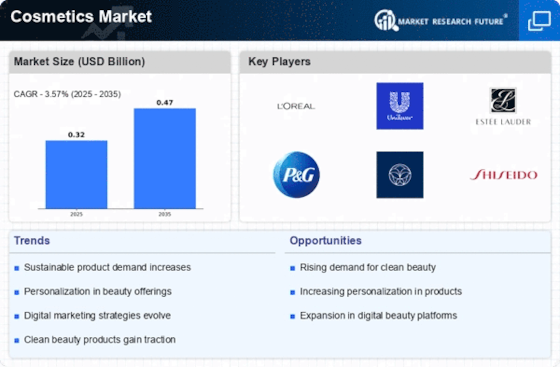
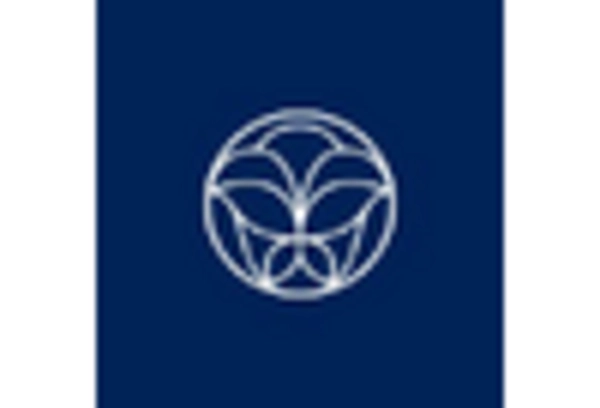
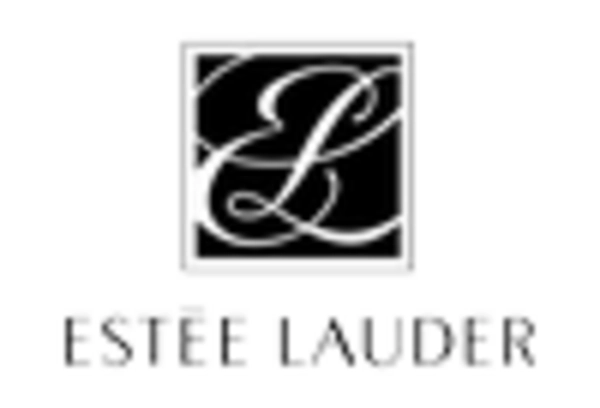
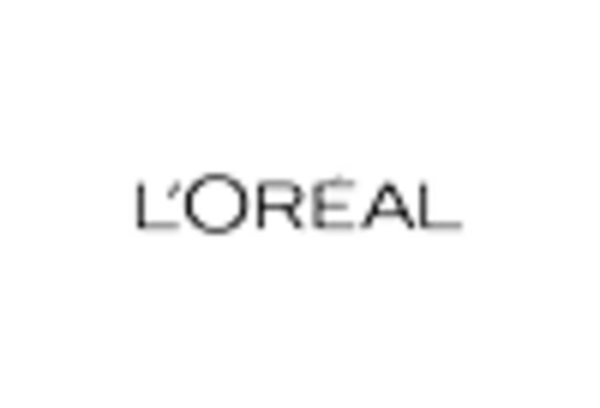

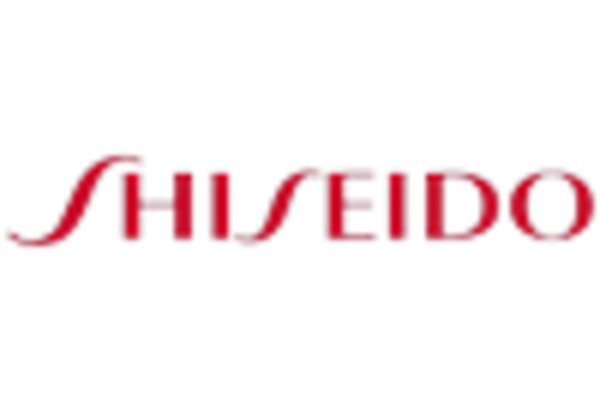










Leave a Comment